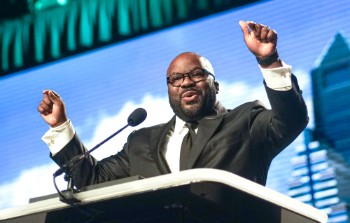
PHOENIX—The 2017 SBC Pastors’ Conference proved historic on many levels including the unanimous election of H.B. Charles Jr., pastor of Shiloh Metropolitan Baptist Church in Jacksonville, Fla., as the conference’s first black president.
In addition to the historic nature of the officer elections, this year’s lineup of speakers included pastors of smaller to average-size Southern Baptist churches preaching through the book of Philippians.
Charles was nominated by Ken Whitten, pastor of Idlewild Baptist Church in Lutz, Fla., who said, “I want to be real clear about one thing—I am not nominating H.B. Charles because of the color of his skin. I’m suggesting that he be the conference president because of the character of his soul and the convictions of his spirit.”
With no other nominees, current conference president Dave Miller asked the crowd to vote by standing and cheering, and the auditorium erupted in applause.
Encouraging and edifying pastors via messages from the book of Philippians, the Pastors’ Conference, with the theme “Above Every Name,” focused on issues such as our dependence on Christ, hope and joy through adversity, finding identity in Christ, obedience, Christian unity, and beholding Christ’s name and example.
David Choi
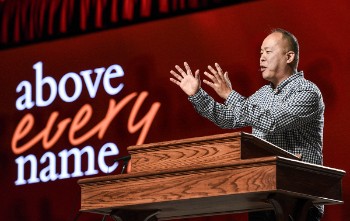
In the opening message, David Choi, pastor of the Church of the Beloved in Chicago, said that even when pastors seem like they’re godly from the outside, they all harbor sin.
“In those moments (that we sin), we are not godly, but He still proclaims us. God frees us to be honest about our sin and our hypocrisy. Your past does not define you. Christ’s past defines you. Because we are servants of Christ Jesus, we have peace that comes from Him.”
Preaching from Philippians 1:1-11, Choi said the Scriptures remind us that we can’t do anything on our own but that through God, we can accomplish anything.
“Every single day of my ministry I am reminded that I have (nothing) to set before my people, because we know that we can’t, but He can. When man works, man works, but when man prays, God works. It’s not about us.”
John Onwuchekwa
“The gospel loves to advance down the avenue of adversity,” John Onwuchekwa, pastor of Cornerstone Church in Atlanta, told pastors.
With Philippians 1:12-26 as his Scripture, the pastor acknowledged that pastors are prone to despair because their suffering is “vigorous and vicarious.” He shared that as he launched Cornerstone Church two-and-a-half years ago, several personal crises, including a failed adoption, the death of his brother and other challenges, propelled him toward despair.
“Despair,” he said, “doesn’t grow out of bad occurrences but out of a bad outlook.”
Through that adversity and the words of Scripture, he learned to tether his hope for joy to “the goodness of God,” much like the apostle Paul, who, in the midst of adversity, “didn’t pray for things to change circumstantially.”
Circumstances in life are “inconsistent, unreliable and unpredictable,” while our Savior is “consistent, reliable and predictable,” Onwuchekwa said. In spite of adversity, “You and I have every reason to rejoice.”
Chris Davis
Chris Davis, pastor of Groveton Baptist Church in Alexandria, Va., used Paul’s words in Philippians 1:27-30 to challenge Southern Baptists to see their main identity as citizens of heaven and not as citizens of the United States.
“If Christ’s lordship does not supersede our American concerns, we will lose our testimony and we will jettison our calling—our mission to make Christ-followers of all nations,” Davis said.
As the culture becomes more intolerant of Christians, and as the political landscape becomes more unpredictable, Davis said, Christians must radically embrace their shared identity and shared mission in the gospel of Jesus Christ.
They must do so, he said, with a spirit of boldness and without cowering in the face of every threat. When Paul was in a Philippian jail, Davis said, the salvation of the jailer came not through a complaint about a loss of rights but through the praises sung to God.
“Let us turn up the volume of our oneness of those mercifully rescued by Jesus, and let us turn down the volume of our opinions about American politicians and policies…,” Davis urged.
Jimmy Meek
Jimmy Meek, pastor of Immanuel Baptist Church in El Dorado, Ark., preached on Philippians 2:1-4, declaring that “People are inherently not unified,” and that “True unity comes through the gospel.”
Christians have been reconciled to God, and it is the job of the Christian to help lost people become reconciled to God, Meeks said.
“Yet, when unchurched people, when lost people look at our churches, many times they see people that can’t even be reconciled to each other,” Meeks said.
Meek referenced the book “Tally Ho the Fox,” in which Herb Hodges describes the problems that occur when hunting dogs do not do the things “they are wired to do.” Like hunting dogs, Meek said churches encounter issues when they fail to find unity in the gospel.
“What if your church was doing what it is wired to do?” Meek inquired. “They’d no longer care about trivial things; they’d no longer be sleepy or lazy; they’d no longer have that unnecessary hierarchy; they’d no longer wish they had fewer members so they could be in charge.”
Nathan Rose
Turning our gaze upon Jesus’ incarnation, sacrifice on the cross, and exultation is the answer to a loss of focus in proclaiming the gospel and for the selfishness that is pervading society and our churches, explained Nathan Rose, pastor of Liberty Baptist Church in Liberty, Mo.
Teaching from Philippians 2:5-11, Rose noted that there is a dangerous trend of pride and self-absorption in our churches, and that it’s leading to personal and church self-destruction as well as the hindering of gospel advancement.
“How do we combat this? The biblical solution for fixing behavior always begins with fixing our gaze on Jesus Christ. The key to cultivating humility and selflessness is contemplating the person and work of Jesus Christ.”
Rose showed how the apostle Paul exhorted believers to emulate Jesus’ example of selflessness and always placing others as more important than Himself.
In noting that Jesus’ death on the cross was in utter obedience to the Father, Rose said, “This reality proves that Jesus Christ loves you, cherishes you, accepts you … This is the good news of the gospel.”
Ryan Rice
Ryan Rice, pastor of Connect Church of Algiers in New Orleans, drew from Philippians 2:12-18 to encourage pastors to “live lives poured out for Jesus.”
Paul’s exhortation to continue on in obedience to Christ is a call pastors must heed today, Rice said.
Acknowledging that ministry is difficult, Rice encouraged listeners not to give up but to press forward in “practical obedience” to God’s calling by staying focused on Christ.
“Keep plowing in the lane God has set you in,” Rice said. “Keep following wherever He has placed you. You can continue on if your eyes are set on Jesus.”
Jamar Andrews
Speaking on Philippians 2:19-30, Jamar Andrews, lead pastor of Word Baptist Church in Jonesboro, Ark., highlighted Timothy and Epaphroditus as examples of Christians who lived lives worthy of the gospel.
“When we think about what Christ has called us to, we must make sure that our agendas match His and that our interests match His,” Andrews said. “Timothy had a mind, attitude and disposition that kept Jesus Christ and His interests first.”
Andrews said character is “one of the most important assets we have as a messenger of the gospel… We want people to see that the message that we share is also the message that we live.”
Every person has three tongues, Andrews said—one in our mouth and one on each foot. “The reality is that when we think about character, the one that’s in our mouth must be saying the same thing as the ones that are on our shoes,” he said.
Jose Abella
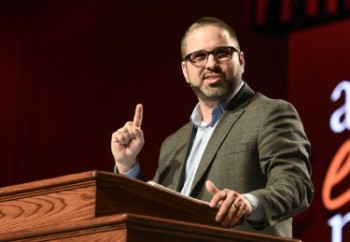
Jose Abella, pastor of Providence Road Church in Miami, preaches during the Pastors� Conference at the Phoenix Convention Center. He preached from the text of Philippians 3:1-11. Photo by Jeremy Scott)
Preaching from Philippians 3:1-11, Jose Abella, pastor of Providence Road Baptist Church in Miami, exhorted, “We must be a people that pursue gospel clarity.”
The son of Cuban immigrants, Abella described the first time he visited Cuba in 2013 and saw a river that flowed through the rural farming community where his parents had lived.
“What I saw amazed me. The clarity of the water,” he said, “was truly a sight to see.” Three years later when he returned with his wife, however, the water was “murky and full of debris.”
“I wonder if the river of the gospel that runs through our churches and convention flows with such beauty and clarity,” Abella said. “I wonder if there’s any debris of legalism, antinomianism and everything in between blurring gospel waters.
“If the gospel loses its clarity, it will lose its redemptive beauty and power,” he warned.
Spencer Plumlee
Spencer Plumlee, pastor of Riverview Baptist Church in Osage Beach, Mo., continued in Philippians 3:12-16, where Paul discusses striving toward the ultimate goal of eternal fellowship with God in Heaven: “forgetting what is behind and reaching forward to what is ahead, I pursue as my goal the prize promised by God’s heavenly call in Christ Jesus.”
Plumlee said the passage calls believers to an urgency in their work, an urgency to live each day as if it is their last.
“Are you presenting a gospel that calls them to victorious urgency? My fear is that we stop at conversion and talk about people’s future without addressing the present life God has called us to live now. This victorious urgency is not just for the super spiritual; it’s not just for the pastor or missionary; it’s for each and every one of us.”
Michael Allen
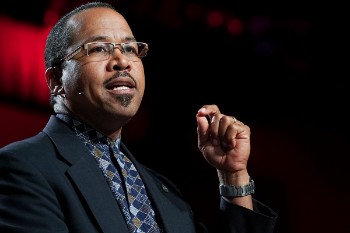
Michael Allen, pastor of Uptown Baptist Church in Chicago, gives a message during the last session of the SBC Pastors� Conference. Allen preached from Philippians 3:17-21. (Photo by Matt Miller)
“There is an obsession these days with leadership and not followership,” said Michael Allen, pastor of Uptown Baptist Church in Chicago, Ill.
“Yet, there are at least twice as many scriptural references to followership than there are to leadership.”
Preaching from Philippians 3:17–4:1, Allen said those verses show that there are two imperatives to followership: 1) In verse 17, Paul exhorts the people to join in—to become like him as he follows Christ. 2) In the same verse, Paul says to pay attention, or to scope out other saints who are already living according to the example of other saints.
“Paul is not talking about a program for your church,” he said. “He’s talking about following godly people, … being influenced by those who are worthy of being imitated.”
Bart Barber
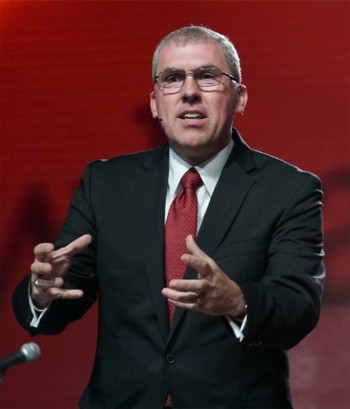
Bart Barber, pastor of First Baptist Church in Farmersville, Texas, preaches during the final session of the Pastors� Conference. He spoke on Philippians 4:1-9. (Photo by Matt Miller)
Bart Barber, pastor of First Baptist Church in Farmersville, Texas, delivered a message from Philippians 4:2-9, calling for God to raise up more peacemakers in Southern Baptist churches.
Noting that Paul names people in the church who were causing problems, and he calls out the peacemakers to bring reconciliation, Barber explained that much of the conflict in Southern Baptist churches is not simply because of the presence of conflict but rather because of the absence of peacemakers.
Barber said if pastors are going to call people to be peacemakers in the church, then they are going to have to teach them how to do it effectively by training their manners, emotions and thinking.
“The lie straight from hell that plagues our churches is that we think if we’re going to be mannerly, we can’t make anybody’s business ours,” Barber said. “We see trouble in church, and we say, ‘Y’all take care of that. Good luck.’“
But, he said, Paul challenges the church in Philippi to step in and help bring harmony in the body of Christ.
Shane Hall
The conference came to an emotional end as conference leaders gathered in prayer around Shane Hall, pastor of First Southern Baptist Church in Del City, Okla. Hall, who suffers from the relapse of an incurable strain of stomach cancer. Hall closed the study of Philippians from the benediction of Paul’s letter with the simple message, “All we need is Jesus.”
Hall said this closing passage contains one of the most often misused and misapplied verses of Scripture—”I can do all things through him who strengthens me” (Philippians 4:13). But the driving theme of this letter, and of Paul’s life, was a total reliance on the person and Godhood of Jesus, who makes everything in life, the good times and the bad, bearable. “For Paul, all he needed was Jesus.”
But the cancer-embattled pastor emphasized Paul’s contentment and total reliance in Jesus did not come without a price.
“Paul learned it in the school of contentment,” he said. “That is not a school that we want. Why? Because in the school of contentment we learn that Christ is all we need—not when we have much, but when we have little. Not when we have everything, but when we have nothing. When things have been stripped from us and we are at life’s worst circumstances, that is when we learn to be content in Christ alone.”